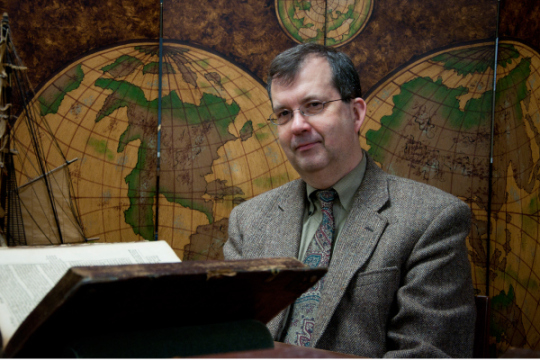
“Stop thinking about land masses and start thinking about waterways,” declares English professor John Watkins. “The world changes drastically. And you get a very different kind of literary history.”
Watkins has observed this shift in history departments. It’s obvious that he’s already on board.
“There’s a tendency among humanists to think about their work in terms of, ‘There’s this book, followed by this book, followed by this book,’” says Watkins. “I think of my work in more of a social scientist model—which is in terms of streams.”
Although Watkins admits wryly that he is “technically the Shakespeare-Renaissance guy,” his interests in medieval history and the classics led him to question periodization. The result: projects such as the boundary-crossing book he co-edited with Curtis Perry, Shakespeare and the Middle Ages (Oxford University Press, 2009).
What Watkins describes as his “main stream”—diplomacy and interstate relations—can branch into a collaboration with someone like historian Carol Levin, investigating how Shakespeare configures images of foreigners and of the “foreigner” within, culminating in Shakespeare’s Foreign Worlds: National and Transnational Identities in the Elizabethan Age (Cornell University Press, 2009).
Or the stream can run through his current primary project, investigating marriage diplomacy from Virgil to Marie Antoinette.
Such works, along with his charismatic and provocative teaching, are reasons Watkins was named a Distinguished McKnight University Professor last spring. He previously received the University’s McKnight Land-Grant Professorship, was a CLA Scholar of the College (2004-07), and has won every undergraduate teaching award available.
A less visible achievement, perhaps, is his success as a dissertation director. In a dismal academic job market, Watkins’ advisees have a remarkable record of tenure-track placement, and one of them—Elizabeth Weixel—won the Graduate School’s Best Dissertation award in the arts and humanities last spring.
Watkins attributes such students’ accomplishments to the growing strength of medieval and early modern studies here, with faculty members ranging from regents professors to new hires, college support, and centers. Related courses are available in a wide variety of disciplines, such as history, French and Italian, and German studies. There is also a critical mass of students, Watkins says. The Medieval and Early Modern Research Group is “very much student owned and operated, where they can have exchanges but not have direct faculty presence.”
“Students have an intellectual life above and beyond the faculty,” he continues. “They need to find their own language. As someone who has strong interests in Montessori education, this sounds right to me: that there are times when your job is to shut up and get out of the way.”
Linda Shenk, who completed her doctorate in 2002, is an assistant professor at Iowa State University. This year she published Learned Queen: The Image of Elizabeth I in Politics and Poetry, a book based on her dissertation with Watkins.
“I had the kind of first semester that made me unsure as to whether or not I wanted to continue,” says Shenk. “But the work I started to pursue with his encouragement that semester led not only to my dissertation but also to my book. I marvel at his amazing mind and clever wit, but what I appreciate most […] is his ability to give students the intellectual support they need so that they challenge themselves.”
To a certain extent, Watkins is providing the kind of direction he wishes he experienced in graduate school at Yale University. Raised in Hot Springs, Arkansas, Watkins earned his B.A. in English at Indiana University with major coursework in French and history. Then he received a Marshall Scholarship, one of 30 given that year for U.S. scholars to study in Britain. At Oxford University for two years, they sent him to the library and he “read like crazy.” He loved it. He still chairs the Rhodes-Marshall selection committee annually here.
His Oxford tutor, John Pitcher, assigned him the topic that would jumpstart his career.
“It was a standard Oxford thing,” Watkins relates: “’I want you to go out and think about Spenser and Virgil. Think about the Aeneid, and what it would be like to read the Aeneid in 16th century Ireland.’ The way it worked, you would read for a couple of weeks, and the day before you met with your tutor, you’d write the essay. I was up all night thinking, ‘What the heck am I going to write tomorrow?’ Deep in the night I started seeing a pattern about female abandonment, and I suddenly realized that what’s driving this form is ‘How on earth do you take an epic model that is focused in so many ways on female abandonment—you have to leave Dido to go to Rome . . . how on earth do you turn that model into a compliment to Elizabeth I?’ And that became my first book.”
Collaborations come easily to Watkins, who has not only co-authored and co-edited books, but regularly co-teaches courses with colleagues in history and in French and Italian.
“I think there’s a reason I write on diplomacy,” he grants. “I’m really interested in what happens when you bring things into dialogue. It’s a way that you keep growing yourself.”
A dedicated traveler, Watkins’ favorite city is Venice, one of the world’s wateriest. Former advisee Shenk likens the research process that Watkins models to strolling in that city.
“You put your map in your backpack so that you can go down pathways that interest you,” she explains, “and often you discover things that you never imagined. I thank John for teaching me that mentoring is giving my graduate students their individual Venices to explore.”
Adapted with permission from an article by Terri Sutton published on Dec. 7, 2010, in the CLA Publications blog.